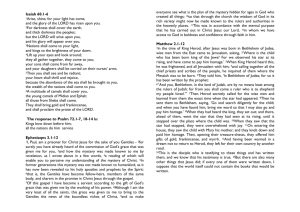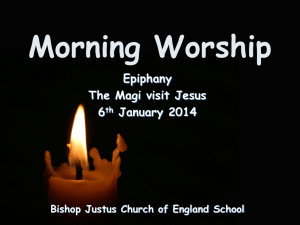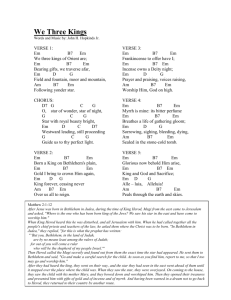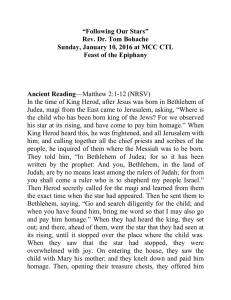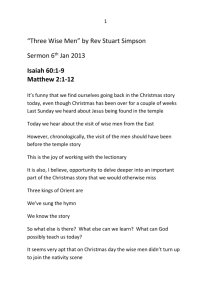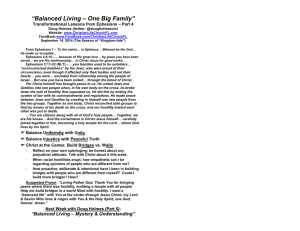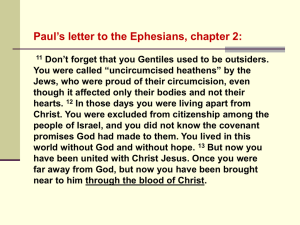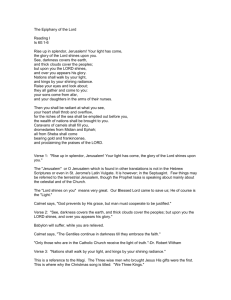Notes for next Sunday
advertisement
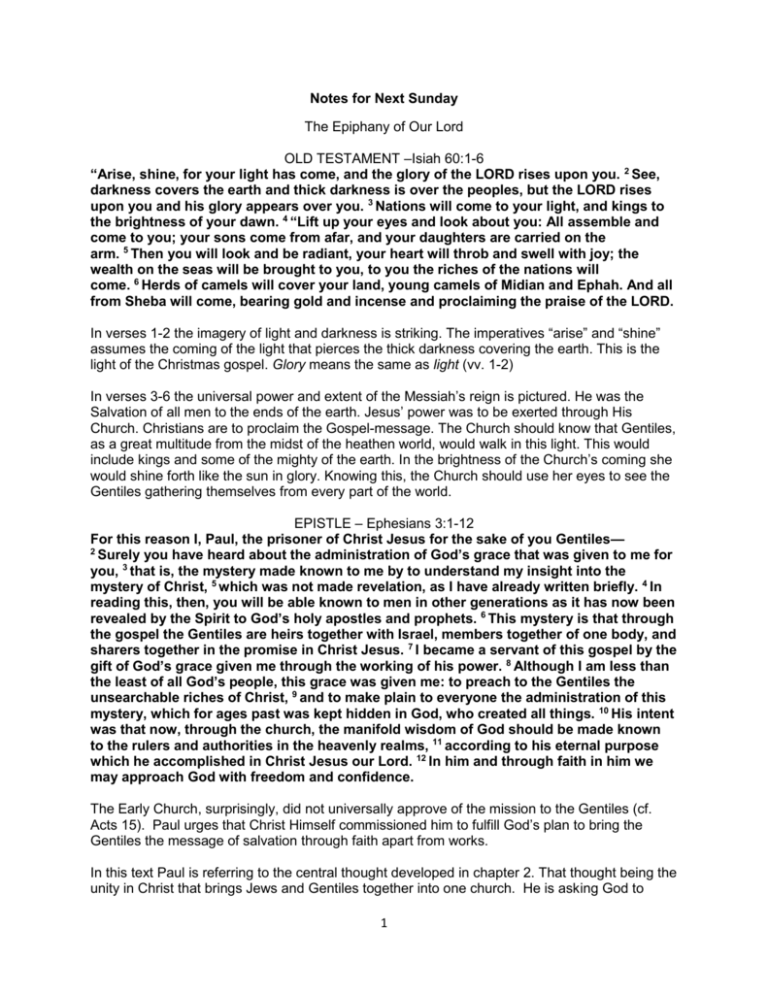
Notes for Next Sunday The Epiphany of Our Lord OLD TESTAMENT –Isiah 60:1-6 “Arise, shine, for your light has come, and the glory of the LORD rises upon you. 2 See, darkness covers the earth and thick darkness is over the peoples, but the LORD rises upon you and his glory appears over you. 3 Nations will come to your light, and kings to the brightness of your dawn. 4 “Lift up your eyes and look about you: All assemble and come to you; your sons come from afar, and your daughters are carried on the arm. 5 Then you will look and be radiant, your heart will throb and swell with joy; the wealth on the seas will be brought to you, to you the riches of the nations will come. 6 Herds of camels will cover your land, young camels of Midian and Ephah. And all from Sheba will come, bearing gold and incense and proclaiming the praise of the LORD. In verses 1-2 the imagery of light and darkness is striking. The imperatives “arise” and “shine” assumes the coming of the light that pierces the thick darkness covering the earth. This is the light of the Christmas gospel. Glory means the same as light (vv. 1-2) In verses 3-6 the universal power and extent of the Messiah’s reign is pictured. He was the Salvation of all men to the ends of the earth. Jesus’ power was to be exerted through His Church. Christians are to proclaim the Gospel-message. The Church should know that Gentiles, as a great multitude from the midst of the heathen world, would walk in this light. This would include kings and some of the mighty of the earth. In the brightness of the Church’s coming she would shine forth like the sun in glory. Knowing this, the Church should use her eyes to see the Gentiles gathering themselves from every part of the world. EPISTLE – Ephesians 3:1-12 For this reason I, Paul, the prisoner of Christ Jesus for the sake of you Gentiles— 2 Surely you have heard about the administration of God’s grace that was given to me for you, 3 that is, the mystery made known to me by to understand my insight into the mystery of Christ, 5 which was not made revelation, as I have already written briefly. 4 In reading this, then, you will be able known to men in other generations as it has now been revealed by the Spirit to God’s holy apostles and prophets. 6 This mystery is that through the gospel the Gentiles are heirs together with Israel, members together of one body, and sharers together in the promise in Christ Jesus. 7 I became a servant of this gospel by the gift of God’s grace given me through the working of his power. 8 Although I am less than the least of all God’s people, this grace was given me: to preach to the Gentiles the unsearchable riches of Christ, 9 and to make plain to everyone the administration of this mystery, which for ages past was kept hidden in God, who created all things. 10 His intent was that now, through the church, the manifold wisdom of God should be made known to the rulers and authorities in the heavenly realms, 11 according to his eternal purpose which he accomplished in Christ Jesus our Lord. 12 In him and through faith in him we may approach God with freedom and confidence. The Early Church, surprisingly, did not universally approve of the mission to the Gentiles (cf. Acts 15). Paul urges that Christ Himself commissioned him to fulfill God’s plan to bring the Gentiles the message of salvation through faith apart from works. In this text Paul is referring to the central thought developed in chapter 2. That thought being the unity in Christ that brings Jews and Gentiles together into one church. He is asking God to 1 enlighten the Ephesians with the Good News that Christ died for them. He wants them to understand just how more fully and great Christ’s love actually is for them. GOSPEL – Matthew 2:1-12 After Jesus was born in Bethlehem in Judea, during the time of King Herod, Magi from the east came to Jerusalem 2 and asked, “Where is the one who has been born king of the Jews? We saw his star in the east and have come to worship him.” 3 When King Herod heard this he was disturbed, and all Jerusalem with him. 4 When he had called together all the people’s chief priests and teachers of the law, he asked them where the Christ was to be born. 5 “In Bethlehem in Judea,” they replied, “for this is what the prophet has written: 6 ”‘But you, Bethlehem, in the land of Judah, are by no means least among the rulers of Judah; for out of you will come a ruler who will be the shepherd of my people Israel.’ 7 Then Herod called the Magi secretly and found out from them the exact time the star had appeared. 8 He sent them to Bethlehem and said, “Go and make a careful search for the child. As soon as you find him, report to me, so that I too may go and worship him.” 9 After they had heard the king, they went on their way, and the star they had seen in the east e went ahead of them until it stopped over the place where the child was. 10 When they saw the star, they were overjoyed. 11 On coming to the house, they saw the child with his mother Mary, and they bowed down and worshiped him. Then they opened their treasures and presented him with gifts of gold and of incense and of myrrh. 12 And having been warned in a dream not to go back to Herod, they returned to their country by another route. Bethlehem is 5 miles South of Jerusalem. It is the town where David was born and anointed king (1 Sam 16:1-13) (v. 1) Herod was a non-Jew who was appointed king of Judea by the Roman Senate in 40 B.C. and gained control in 37. Like most rulers of the day, he was ruthless, murdering his wife, his three sons, mother-in-law, brother-in-law, uncle and many others—not to mention the babies in Bethlehem (v. 16). His reign was also noted for splendor, as seen in the many theaters, amphitheaters, monuments, pagan altars, fortresses and other buildings he erected or refurbished—including the greatest work of all, the rebuilding of the temple in Jerusalem. The magi from the East were Gentiles probably came from Persia, Babylon, or Arabia. Their kind of wisdom was not always God-pleasing. The Magi may have seen a natural astronomical phenomenon, but more likely the appearance of the star was a miraculous event (cf. 9). Herod feared that his rule might be challenged. The people dreaded Herod’s rage and his cruel reaction to this report (v. 16). In verse 8 Herod shows his hypocrisy. Contrary to tradition, the Magi did not visit Jesus at the manger on the night of his birth as did the shepherds. They came some months later and visited him as a “child” in his “house” (v. 11) The gifts of gold, incense, and myrrh (v. 11) perhaps gave rise to the legend that there were three “wise men.” But the Bible does not indicate the number of the Magi, and they were almost certainly not kings. Gold suggests royalty. Incense was used in connection with worship. Its aromatic smoke symbolized the God-pleasing prayers of the people ascending to the throne of God. Myrrh symbolizes Jesus suffering and death. 2
